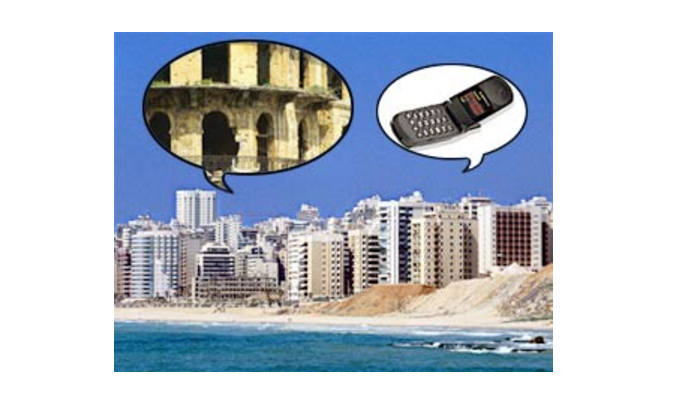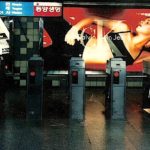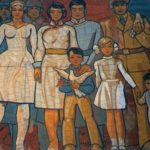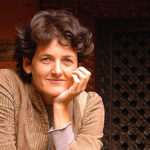Taken under the wing of a Lebanese detergent tycoon, our correspondent learns that there’s a fine line between hospitality and kidnapping.
By Rolf Potts
I first met Mr. Ibrahim in the Hamra district of West Beirut. At the time, I’d been searching for a pub that had been recommended to me second-hand, and I wasn’t having much luck. I was studying my street map on the corner of Hamra and Rue Jeanne d’Arc when Mr. Ibrahim approached me, looking innocuous in his blue jeans, plaid shirt and neatly trimmed goatee.
“Are you lost?” he’d asked me.
“Not really,” I said. “I know where I am; I just can’t find the place I want to go.”
“I am Mr. Ibrahim,” he said, gesturing grandly at the buildings of Beirut, “and this is my city.” He looked to be in his early thirties, but he spoke like he thought of himself as a wizened old patriarch. “Where do you wish to go?”
“Well, it’s a pub that a friend of a friend told me about, but I’m not sure if you would know where –”
“THIS IS MY CITY!” Mr. Ibrahim bellowed happily.
“Oh, right. Well, I’m looking for a—”
“Where are you from?”
“I’m from America.”
“AMERICA!” Mr. Ibrahim yelled, his voice echoing through the street. He pulled out his wallet and produced a dollar bill. “What is this?” he asked me.
“Um, it’s a dollar.”
“And what does it say?”
“It says, ‘one dollar.'”
“NO!” Ibrahim boomed. He held the dollar up in front of my face. “It says ‘…IN …GOD …WE …TRUST’!”
“In God we trust,” I repeated, not sure what the point was.
“That’s why your country is great: Because you trust in God.” Mr. Ibrahim magnanimously handed me the dollar bill. “You keep this,” he said.
“Well, that’s nice,” I said holding the dollar back out to him, “but I don’t need a dollar as much as I need to find–”
“YOU KEEP THIS!” Mr. Ibrahim hollered cheerfully, snatching the dollar from my hand and stuffing it into my shirt-pocket. “Every day you must pray to God for sex, and he will give you more dollars than you ever dreamed of.”
“Pray for sex?”
“Yes, pray for sexus!” He beamed proudly, as if he’d just changed my life.
“Oh,” I said, catching his accent. “Pray for success.”
“SEX-CESS!” Mr. Ibrahim yelled, suddenly looking impatient. “Where do you want to go? This is my city, and I can show you anywhere.”
“Well, a friend’s friend told me about a pub called the Hole in the Wall…” I began. As I spoke, Mr. Ibrahim pulled out his cell-phone and began to furiously punch in numbers. “…I’m just not sure if I’m even in the right –”
I paused as Mr. Ibrahim began to shout Arabic into his cell-phone. He stopped for a moment and looked over at me. “Where do we go?”
“The Hole in the Wall.”
“THE HOLY DIWAH!” he yelled at his phone. He punched another button and put the phone back into his pocket.
“Who was that you were talking to?” I asked.
“It’s OK, we will take you there. It is my pleasure.”
“Yes, but who’s we? Who was on the phone?”
“That was Abdul.”
“Is he a friend of yours?”
“OF COURSE NOT!” Mr. Ibrahim boomed, laughing. “Abdul is my bodyguard!”
Five minutes later, a massive young man drove up in a gold Mercedes E300. The door locks, I noticed, were tipped with rhinestones. At Mr. Ibrahim’s grand insistence, I took the shotgun seat, and — for all practical purposes — I was his hostage for the next three days.
* * *
The hours before my first encounter with Mr. Ibrahim stand out in vivid contrast with what was to follow, if nothing else for their relative peace and coherence.
I’d arrived in Beirut the previous afternoon, but I hadn’t set off to explore the city itself until that morning. Striking out from my hotel, I strolled past the impressively redeveloped central business district, the Roman ruins of Cardo Maximus, and the idyllic campus of the American University.
The most intriguing thing I discovered that morning, however, was the stark evidence of the civil war that had once raged through the city. An abundance of bullet-scarred buildings stood in bleak contrast to the ongoing renovations, particularly along the Green Line that once separated Muslim West Beirut from the Christian East.
I’m not sure why these war remnants proved so fascinating for me. In a way, I don’t even like war tourism, as it reduces certain places — Sarajevo, Belfast, Phnom Penh — into dull, de facto thrill-destinations, relevant only for the visceral buzz of recent history. Here, travelers photograph soldiers and barbed wire with the same blind compulsion that inspires them to photograph the Eiffel Tower in Paris.
In Beirut, which has only been open to American travelers since 1997, I found it difficult not to be a war tourist. The battered buildings of the old buffer zone proved a grim reminder of not just the Muslim-Christian discord that symbolized the war, but the international factors that started and prolonged it: French favoritism, American geopolitics, Syrian opportunism, Israeli brutality, Iranian radicalism, Palestinian rage. In some places, bullet-holes in buildings were so common that they seemed a part of the architecture — a congenital concrete defect that just happened to afflict that neighborhood.
By its very definition, war tourism is a fickle activity. Stunned as I was by the evidence of war — sobered as I was by its devastation — I left the Green Line that evening looking for a place to party.
Using directions copied from a month-old e-mail, I began to walk in search of the Hole in the Wall pub. Less than an hour later, I found myself in the ruthlessly gung-ho custody of a man who called himself Mr. Ibrahim.
* * *
When I first got into Mr. Ibrahim’s Mercedes, I thought maybe he was one of those rich guys who runs with showgirls and compulsively hands out bottles of Hennessey and boxes of Cuban cigars. As it turned out, he was a celibate teetotaler who vetoed our trip to the Hole in the Wall the moment I mentioned that the place served alcohol.
We ended up driving to the Weekland, an upscale buffet restaurant that had been booked up that night for a Sunni Muslim wedding. Unphased by our lack of a reservation, Mr. Ibrahim bullied his way into getting us a table overlooking the courtyard fountain. As Mr. Ibrahim instructed Abdul the Bodyguard to fill my plate with lamb, kibbeh and hummus from the buffet, I took in my surroundings. Down in the courtyard, an immaculately dressed bride and groom cut their cake and posed for a photographer. Across the restaurant, groups of relatives watched this unfold live on a big-screen TV. At the tables around us, tuxedo-clad Sunni men smoked cigarettes and squinted at their cell-phones. The Sunni women chatted amongst themselves, looking refined and downright sexy in their designer dresses and silken headscarves.
The Lebanese food was fantastic, and Mr. Ibrahim was thrilled that I ate it with such enthusiasm.
“Do you like my food?” he asked me, grinning like a madman.
“It’s great,” I said between mouthfuls.
“How about my city? Did you see my city today?”
“Yes, I walked around some this afternoon.”
“What did you see? Did you see the Hard Rock Cafe?”
“No, but I visited the American Univ –”
“That was a trick question: Beirut has TWO Hard Rock Cafes!”
“Wow. Well, I haven’t seen either one of them yet, but–”
“TWO HARD ROCK CAFES!” Mr. Ibrahim hollered happily.
“Right, but today I went walking along the old Green Line and–”
“I’m sorry, where did you say?”
“The Green Line. I went walking–”
“THE GREEN LINE IS NOT FOR TOURISTS!” Mr. Ibrahim yelled, shaking his finger at me. For the first time since I’d met him, Mr. Ibrahim was not grinning, and this gave me a chill.
“What?” I stammered.
“The Green Line has only bullets and old buildings. Why do you want to see that?”
“Well, I thought it would be interesting to –”
“DO THESE PEOPLE LOOK LIKE TERRORISTS?” Mr. Ibrahim gestured angrily at the wedding guests, his voice echoing off the walls.
“Of course they don’t look like terrorists.”
“OF COURSE NOT! Look at them! This is like Europe. Does this not look like Europe?”
“Yes, it’s very nice.”
“Then why do you go to look at buildings with bullets?”
“I don’t know. I guess it just seemed –”
“THERE WERE 180 LEBANESE ON THE TITANIC!”
I stared at Mr. Ibrahim, momentarily speechless. Since it looked like his grin might return, I decided to play along. “Really?” I said, completely oblivious to how this factoid could have any relevance. “180 Lebanese were on the Titanic?”
“Of course! They were all rich men. Businessmen. Like Europeans. Do you think they would let terrorists onto the Titanic?”
“I’d imagine they wouldn’t.”
“Of course not! The Lebanese have always been rich people. Important people. Do you know how many Lebanese there are in Bill Clinton’s cabinet?”
“I don’t know.”
“FOUR! There are four Lebanese in Bill Clinton’s cabinet. I know this, and I am not even American! And the president of Ecuador. Do you know where he is from?”
“Well I’d imagine he’s from Ecuador.”
“HE IS FROM LEBANON!” Mr. Ibrahim roared, obviously having a good time again. “And when Boris Yeltsin needed surgery for his heart, where do you think his surgeon was from?”
“Lebanon?”
Mr. Ibrahim beamed at me. “I think you are a genius. The surgeon was from Lebanon. He could have had any surgeon in the world, but he wanted the best, and the best was from Lebanon.
Mr. Ibrahim went on like this nonstop for 20 minutes. Once he had exhausted the topic of Lebanese pride, he went on to rant about the evils of tobacco and alcohol, the virtues of America, the scourge of foreign laborers in Lebanon, and how Syrians smell like pigs and dogs. The whole time this was going on, Abdul the Bodyguard blissfully ignored his boss, shoveling down plate after plate of the buffet food. Whenever, Mr. Ibrahim would leave the table to get more food or bully the wait staff, Abdul would smile mischievously and point out cute girls in the wedding party.
Later, when Abdul was driving us back to my hotel, Mr. Ibrahim laid out our plans for the next day. “Tomorrow, we will go to Byblos,” he said. “I will show you Lebanon, and you can teach me English. How is my English? Is it bad?” Mr. Ibrahim grinned at me from the back seat, obviously fishing for a compliment.
I decided to shoot him straight. “Well, your vocabulary is good, but your–”
“I took many lessons from an institute near the American University.”
“Yes, well your pronunciation could–”
“I SPEAK ENGLISH LIKE AN AMERICAN, YES?” Mr. Ibrahim shouted. He grinned, ebullient, in the back seat.
“Well, kind of. But your pronunciation could use some work.”
Mr. Ibrahim looked concerned for just a fraction of a second. “You must teach me to make it better. We will be business partners: I will show you Lebanon, and you will teach me English.”
“OK, well the best way to improve your pronunciation is to –”
“I think you are the best teacher, so I will be the best tour guide!”
“…is to listen and practice. Listen and practice, and your pronunciation will get better.”
“LISTEN AND PRACTICE!” Ibrahim yelled happily.
But of course he wasn’t really listening.
* * *
Sightseeing with Mr. Ibrahim the next day turned out to be like some kind of bizarre religious penance or fraternity initiation. As we walked through the old Crusader castle and Roman ruins at Byblos, Mr. Ibrahim demanded that I peek into every single tomb, climb every single rampart, and photograph every single colonnade. “WHEN WILL YOU COME TO LEBANON AGAIN?” Mr. Ibrahim would shout every time I tried to complain about this. “THIS IS THE HISTORY OF MY COUNTRY!” As we walked from ruin to ruin, Mr. Ibrahim wanted to know my opinion about each detail of the experience, and he got grumpy whenever he thought I wasn’t being enthusiastic enough.
Amidst this tireless touristic browbeating, I slowly learned things about my hell-bent host. Mr. Ibrahim, I discovered, was 32 years old, and the son of a Sunni Muslim father and a Maronite Christian mother. As a child, he and his family lived on the Green Line, and the young Ibrahim came to admire the American soldiers who patrolled his neighborhood. Sometimes, the soldiers would give him vacuum-wrapped MREs (Meals Ready to Eat) — dehydrated army food that tasted like chicken or beef or coffee. Ibrahim idolized the foreign soldiers, and — much to the consternation of his family — he hung a small American flag in his bedroom. Eventually, the Americans withdrew from Beirut, and Ibrahim’s home was destroyed in the ongoing fighting. Salvaging what they could, he and his family moved in with relatives at the outskirts of town.
After the fighting subsided in 1990, Ibrahim went into business, first selling simple household items within Lebanon and later importing goods from overseas. He first became rich by introducing certain European detergents and soaps to the Lebanese market, and that’s still his main line of business — even though he speaks of branching out into jewelry and women’s shoes.
If there was one thing in which Mr. Ibrahim took the most pride, however, it was the fact that he had not so much as touched a girl in all of his 32 years. When we traveled back down the coast toward Jounieh, I quizzed him about this — and by the time we’d taken the cable car up to the Christian shrine at Harissa, Mr. Ibrahim was happily ranting about his utter lack of a sex life. As we climbed the winding staircase up to the huge Virgin Mary statue, Mr. Ibrahim told heroic stories of celibacy with the same lusty enthusiasm most men reserve for tales of sexual conquest.
“I’ve had 30 different women who wanted to do sex with me, AND I TOLD THEM ALL ‘NO’!” Mr. Ibrahim bellowed, startling a group of Sri Lankan pilgrims as we spiraled our way up to the bronze Virgin. “Some of them rented hotel rooms for me! ONE OF THEM SHOWED ME HER PANTIES! But do you know what I told her?”
“What did you tell her?” I asked wearily.
“I TOLD HER ‘NO’!”
Oddly enough, Mr. Ibrahim was equally preoccupied with people who were highly promiscuous. Abdul the Bodyguard, he repeatedly reminded me, had fathered two children out of wedlock. During his days as a competitive bodybuilder, Abdul had once had sex with five different women over the span of three days. Another associate of Mr. Ibrahim’s, a 60 year-old Saudi man, had supposedly been married to 80 different women, and had fathered 42 kids. This man’s latest wife was a 17 year-old Syrian girl, and on their wedding night he’d taken Viagra and had sex with her 18 times. After that night, Mr. Ibrahim noted happily, the Saudi man was paralyzed for three days.
After Jounieh and Harissa, Mr. Ibrahim had Abdul drive us back to Beirut. At first I thought this meant I would finally get to go home, but instead we ended up cruising the city for two hours. Meticulously avoiding war-damaged areas, Mr. Ibrahim pointed out signs of the prosperous new Lebanon: shopping malls, cinemas, resort hotels, luxury high-rises. “LOOK!” he would holler obsessively. “THIS IS JUST LIKE EUROPE!”
Amidst all the shouting, Mr. Ibrahim seemed to be a man who very earnestly wanted to erase all the reputation and memories from a war that had ravaged his home. Somehow, through sheer force of personality, he hoped to turn Lebanon back into a booming, Westernized country. And I think he saw me as a kind of captive emissary who could bring the good news back to America.
Consequently, I shouldn’t have been surprised when he arrived unannounced at my hotel the following morning, ranting about all the thousands of dollars in business he was passing up just so he could take me to the Chouf Mountains. Out of obligation, interpersonal cowardice, and lack of a ready excuse, I consented.
About five minutes out of Beirut, however, the presence of a Syrian military checkpoint got Mr. Ibrahim off onto an anti-Syria diatribe that hadn’t let up by the time we’d entered the mountains. The solution to the Syrian military and political presence in Lebanon, he’d reasoned, was to have the United States bomb the bejesus out of Damascus.
After he’d demanded for the 23rd time that I write a letter to President Clinton in support of this diplomatic strategy, I pointed out that — technically — he could go to the White House website and write that letter himself. Less than one hour later, our plans to visit Beit Ed-Dine Palace had summarily been scrapped, and I found myself taking dictation from Mr. Ibrahim in a West Beirut internet cafe.
“Do you have an e-mail reply address?” I’d asked him. “It’s required if you’re going to send a message to the White House.”
“OF COURSE!” he boomed. “I use e-mail for business all the time.”
“OK, then what is it?”
“What is what?”
“Your e-mail address.”
Mr. Ibrahim grinned and fluttered his eyelids. “I have many e-mail addresses. Ten, maybe 20 e-mail addresses.”
“Just give me one.”
Mr. Ibrahim’s grin wavered a bit. “I don’t remember.”
“OK,” I said diplomatically, “We’ll use mine.”
By the time we were ready to type the body of the message, Mr. Ibrahim was visibly nervous. “What do I say?” he demanded testily.
“It’s your message,” I replied. “Tell him what’s on your mind.”
“Dear President Clinton,” he dictated. “It is my great pleasure and honor to write to you today, and if you ever come to Lebanon, I will be your tour guide and I will show you that we are a rich and beautiful country, and that we are not terrorists like you think we are.” Mr. Ibrahim paused for a moment. “Is that good?”
“Sure,” I said, keying in his greeting. “It’s your message, so say what you want.”
Mr. Ibrahim grinned thoughtfully and stroked his goatee. “Why do you support Israel when you ignore Lebanon?” he said. “Are we not as good at business as them? Are we not more fashionable? Do we not love America also? SO WHY DO YOU GIVE THEM A BILLION DOLLARS WHILE WE ARE BEING INVADED BY SYRIANS, WHO HATE AMERICA AND SMELL LIKE DOGS?”
“Whoa, slow down,” I said, but Mr. Ibrahim had already gone manic.
“WHEN SADDAM HUSSEIN INVADED KUWAIT, YOU BOMBED BAGHDAD!” he yelled. “SO WHY NOT BOMB DAMASCUS NOW?”
I typed as fast as I could, wincing at Mr. Ibrahim’s reckless bravado. In a way, there was a certain sadness to what he was saying. Though created under circumstances similar to Israel, the nation of Lebanon has always been too small, disorganized and divided to avoid getting bullied by its neighbors.
“LOOK AT US!” Mr. Ibrahim hollered. “LOOK AT THE PEOPLE IN THIS ROOM! WE ARE LIKE AMERICANS! WE ARE LIKE EUROPEANS! WE NEED BUSINESS AND TOURISTS IN LEBANON! WE NEED THE POPE AND MICHAEL JACKSON TO COME AND SEE OUR FACES –”
“I think that’s enough for now,” I interjected.
“I AM NOT FINISHED!” he yelled indignantly.
“The president is a busy man,” I said sagely. “It’s best to keep it short.”
“Yes, you are right,” Mr. Ibrahim said, looking a bit dazed. “Do you think he will write back?”
* * *
The following day, Mr. Ibrahim had to work, so I visited the village of Qana, near the Israeli-occupied zone in south Lebanon.
Of course, it wasn’t that simple. The night before, Mr. Ibrahim had asked me what I was going to do in his absence, and when I told him Qana, he’d nearly lost it.
“YOU SHOULD NOT GO TO QANA!” he’d yelled. “THERE IS NOTHING TO SEE THERE!”
By “nothing to see”, Mr. Ibrahim meant that the place was a reminder of war. In Qana, the main tourist attraction is a Syrian-built memorial to the 200 civilians who died when Israel shelled the town in 1996. However, since Qana is also one of the possible locations of Cana — where Jesus was said to have turned water into wine at a wedding festival — I was able to use this seemingly pious pretext to convince Mr. Ibrahim of my good intentions.
Insisting that I should also visit Sidon during my southbound trek, Mr. Ibrahim gave me $20 to cover transportation and admission fees. Each time I tried to refuse the $20, Mr. Ibrahim accused me of not really wanting to go to Sidon. This accusation, of course, was completely valid. I finally convinced Mr. Ibrahim to keep the money, but he made me promise to call him with a full report as soon as I got home that evening.
By the time I’d taken two buses and a share-taxi down to Qana, the comparative serenity of traveling without Mr. Ibrahim had already made the trip worthwhile. Once in the town, I was more impressed by the sight of daily life in southern Lebanon than I was with the clumsy Syrian memorial to Israeli aggression. South Lebanon is a predominately Shi’ite Muslim area, and huge pictures of the Ayatollah Khomeini hung on buildings and along roadsides. Some neighborhoods flew the yellow flag of Hezbollah, while others displayed the green Amal flag. Despite the violent fanaticism associated with such symbols, however, the town itself went about its business at a casual, friendly pace.
Resolving to overcome my instinctive fear of all the Hezbollah iconography in the area, I hiked out into the countryside beyond the town. After about 15 minutes of walking along a dusty road, I came to a U.N. roadblock manned by a couple of Fijian peacekeepers who introduced themselves as Vasco and Reef. The Fijians were stationed there as part of the U.N. Interim Force in Lebanon (UNIFIL), a mission which — despite its temporary-sounding name — had been in operation since the first Israeli invasion 22 years before.
After I chatted with the blue-bereted soldiers for a couple minutes, a loud explosion rang out, and a plume of smoke rose up from a hill on the horizon.
“Israelis?” I asked the Fijians nervously.
“No,” Vasco laughed. “A rock quarry.”
“How can you tell the difference?”
“Well, the Israelis usually call on the radio before they start shelling us.”
Vasco encouraged me to hang out at the checkpoint for awhile, and Reef went up to the watchtower to prepare some tea. Both Fijians seemed desperate to talk to someone who was fluent in English, and I was certainly thrilled to speak with someone who let me finish my sentences. When Reef returned with cups of milky tea and toast, the three of us chatted about politics, rugby and whether or not Jesus actually came to Qana. Reef was convinced that Jesus had turned the water into wine here in Lebanon; Vasco insisted that the miracle had happened at Kafr Kanna in Israel.
After awhile, a couple of local teenagers walked up to greet the Fijians, and Vasco encouraged them to give me a tour of the area. Mahmoud, the older one, jogged off down the road and came back ten minutes later in his father’s car.
“Mahmoud,” I said as I got into the car. “Is that a Muslim name?”
“Yes, I am Sunni. But many of my friends are Christians. Maybe you’ve heard bad things about Lebanon, but we all get along in my town.”
“What about Shi’ites, do you get along with them?”
“Yes, the Shi’ites are good people. But they don’t like sin, so sometimes they stay to themselves.”
“So does that mean you’re a sinner?”
“Yes,” Mahmoud said seriously. “I like to sin very much.”
After showing me some Roman-era Christian caves on the far side of Qana, Mahmoud took me to an archaeological dig that contained a couple of ancient stone wine vats. A third stone urn sat, broken, at the edge of the pit.
“Were these used to turn water into wine?” I asked Mahmoud.
“I don’t know,” he said, “but I know they are very old. I feel bad for breaking that one.” He pointed to the fractured urn at the edge of the pit.
“That urn is enormous,” I laughed. “How could you have possibly broken it?”
“Well, my father owns a construction company, and I broke it with his bulldozer when we were building a street a couple weeks ago. I thought it was a rock until we took it out of the ground.”
I looked again at the broken urn. Archaeologists go for years without finding anything that big or old, and here Mahmoud had discovered it during his after-school job.
That evening, I returned to Beirut in good spirits. Buoyed by my successful foray into the south of Lebanon, I went out for an evening stroll through East Beirut and ended up stumbling upon (though not entirely by accident) none other than the Hole in the Wall pub. There, I drank a couple of beers and listened to music until just short of 10 o’clock.
When I arrived back at my hotel, Mr. Ibrahim and Abdul the Bodyguard were in the lobby waiting for me. I noticed that Mr. Ibrahim was cradling an enormous plastic tub full of pudding.
“I TOLD YOU TO CALL ME!” he bellowed as soon as he caught sight of me.
“Yes, well I was just going to call–”
“WHERE HAVE YOU BEEN?”
“Well, I started out by going to Qan a–”
“Qana? WHAT ABOUT SIDON?”
At this point, I was too flustered to do anything but lie outright. “Sidon,” I said. “Well, wow! It was great.”
“What did you see there?”
“The ruins. I visited the ruins.” This was a stab in the dark; for all I knew, the big attraction in Sidon was a Tijuana-style donkey show.
“THE RUINS!” Mr. Ibrahim yelled. I wasn’t sure what this meant until he grinned and held up the tub of pudding. “My sister made you some sweets!” he said. “We can eat it together.”
Relieved at being off the hook, I plopped down next to Mr. Ibrahim and started to spoon up the chocolate dessert. After a couple of bites, Mr. Ibrahim tugged the bowl away from me.
“You smell like Al Cole,” he said. One couch over, Abdul diplomatically picked up a magazine and pretended to read it.
“Al Cole?”
“Did you drink al-coal tonight?”
It dawned on me what he meant. “Just a couple of beers,” I said.
“IN SIDON?” Mr. Ibrahim yelled.
“Um, no,” I mumbled. “I had them here in Beirut.”
“You didn’t call me because…YOU …WERE …DRINKING …AL-COAL?” Mr. Ibrahim glowered at me. Obviously, this was a major betrayal in his moral world.
“Like I said, I was going to –”
“I HAVE BEEN WAITING HERE FOR TWO HOURS!”
“Well you didn’t need to come all the way –”
Mr. Ibrahim shoved the tub of pudding over at me. “You eat this,” he said quietly. “I’m not hungry anymore.”
“I’m sorry, it’s just –”
“EAT IT!”
“Doesn’t Abdul want –”
“ABDUL IS NOT HUNGRY EITHER!”
I stared down at the pudding. The plastic tub was so big that I could have used it to smuggle a bowling ball through customs at the airport. There was no way I could have eaten all of it by myself, and I secretly suspected that he’d had his sister prepare it with the sole intention of punishing me for not calling him within the proper time-frame.
Gripping my spoon, I made my best effort. As I choked down the chocolate dessert, it occurred to me that my weird friendship with Mr. Ibrahim betrayed my own credulous, middle-class sense of judgment. Had someone as ruthless and narrow as Mr. Ibrahim been a penniless street-sweeper with a donkey-cart and a chicken instead of a Mercedes and a bodyguard, I doubt I’d have accepted his efforts to help me in the first place — and I certainly wouldn’t have let him know where I was staying. Seeing Lebanon by Mercedes and eating gourmet meals had made me rationalize Mr. Ibrahim’s idiosyncrasies. Somehow, I suspect that both his social life and his moral self-concept depended on people like me.
In the end, Mr. Ibrahim never did force me to eat all of the pudding. After verifying to his satisfaction that I was truly suffering from the effort, he melodramatically forgave me for not calling him, then went home for the night.
If he had any intention of surprising me with a sightseeing trek the next day, I didn’t wait around to find out. Immediately after the pudding incident, I wrote Mr. Ibrahim a note. It read: “I’m sorry to have to tell you this way, but I had to go to Syria on short notice. Thank you for your kindness and hospitality. I will remember Lebanon well.”
The following morning, I left the note with the manager of my hotel and took the first bus up the coast to Tripoli. For the first hour of the bus ride, I had trouble relaxing: I kept expecting the old lady in the seat next to me to pull off a polyurethane face-mask and reveal herself, grinning madly, as Mr. Ibrahim.
As for the note I left with the hotel manager, it wasn’t completely dishonest: I will remember indeed Lebanon well.
It’s just that too much of any good thing has a way of wearing a man down.
This essay originally appeared in Salon on June 6, 2000.





